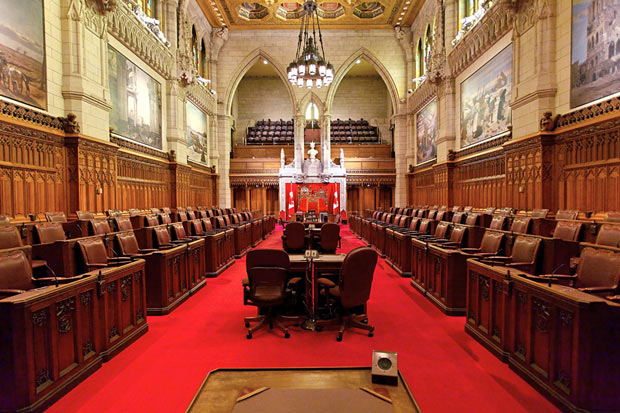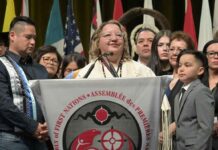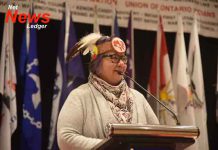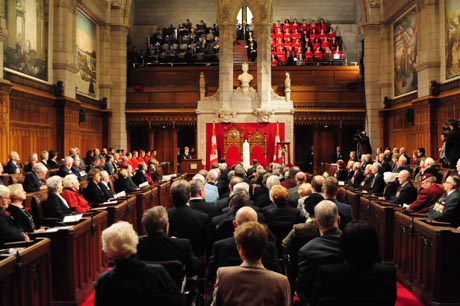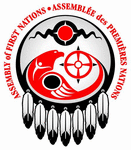 OTTAWA – The Assembly of First Nations was before the Senate Committee on Aboriginal Peoples making a presentation on Bill C-27: First Nations Financial Transparency Act. The Senate Committee is hearing witnesses who are then taking the added information to the Red Chamber where it will be voted on and if passed sent to the Governor General to be passed into law.
OTTAWA – The Assembly of First Nations was before the Senate Committee on Aboriginal Peoples making a presentation on Bill C-27: First Nations Financial Transparency Act. The Senate Committee is hearing witnesses who are then taking the added information to the Red Chamber where it will be voted on and if passed sent to the Governor General to be passed into law.
The presentation was made by the AFN Regional Chief for British Columbia, Jody Wilson-Raybould.
Assembly of First Nations Senate Presentation
My name is Jody Wilson-Raybould. My traditional name is Puglaas. I come from the Musgamagw-Tsawateneuk/Laich-Kwil-Tach people of northern Vancouver Island, where I live in my home community of Cape Mudge with my husband. I am a member of council in my community.
I am here today as the Regional Chief for British Columbia and on behalf of the Assembly of First Nations as the national portfolio holder for First Nations’ governance.
I presented on Bill C-27 before the Commons Standing Committee on October 17, 2012. Some minor changes have been made to the Bill but it is substantially in the same form as it was then. Our core concerns with the Bill remain the same. Both in terms of substance and the process by which it was developed.
I believe some of the changes made were an attempt to respond to concerns that the Bill creates a different standard for First Nations than for other governments in Canada but, ironically, in making them, actually support our contentions that the Bill was ill-conceived in the first place, simplistic and too far reaching.
The AFN has consistently stated that Bill C-27 is misguided legislation that belies a broken relationship between the Government of Canada and First Nations – a relationship that continues to be characterized by federal direction, interference and imposition on First Nation governments – our common message with respect to the federal government’s overall approach to addressing the deficiencies of governance under the Indian Act through its own legislative agenda.
Canada’s approach reflected in Bill C-27, and also in Bills S-2, S-6, and S-8, is that the federal government has the right and, in fact, the responsibility, to determine policy and draft legislation affecting our peoples on matters the government considers to be in our best interests and that it can do so with limited, or no, consultation. This approach persists, despite the existence and broad scope of our inherent right of self-government.
Canada argues that this Bill, like the others – is good for us – good for our citizens and good for the country – in the case of C-27 seeking to ensure increased transparency and accountability – and, therefore, the government says, who can argue with that?
Our perspective, as First Nations – and reflected in our approach to Nation re-building – is quite different from Canada’s – that is, our peoples have the right – and equally important – the responsibility – to determine our own policy and make our own laws that govern our lands and peoples.
As many witnesses to both the Commons and Senate Standing Committees have presented, C-27 is not the mechanism to improve or support accountability. It neither looks to developing standards or capacity to provide sound financial management, nor reflects the work of our Nations to build Financial Administrative Laws and appropriate supportive structures and processes.
Make no mistake, First Nations leaders are fully committed and supportive of transparency and accountability to their citizens. Our Citizens demand it. Idle No More is not just about holding Canada to account for the plight of our peoples but also our own governments. In 2010, Chiefs-in-Assembly passed Resolution 50-2010: First Nation Governments Demonstrating Accountability, which states their commitment to maintaining transparent and accountable decision-making structures and also confirmed their primary reporting and accountability relationship is to their citizens. Not Canada. This resolution, as may have been represented by government witnesses, was not implying support for Bill C-27.
Financial transparency and accountability are aspects of a much broader accountability framework that is part of our Nation rebuilding agenda.
All federal legislation that concerns our peoples’ interests, including C-27, must support this agenda and our transition from essentially being wards of the state under the Indian Act to self-governing peoples with responsibility for good governance – including designing, establishing and then enforcing our own accountability mechanisms.
Those of us who live on-reserve and understand the challenges of rebuilding are not naïve – it is not a simple undertaking to undo 150 years of colonization and rebuild.
The truth is we all have a responsibility to work together and find solutions that facilitate this transition. And not simply to say it is “too hard” or that “we tried” and then use that excuse to take the position that the government is currently taking – to design our post-Indian Act governance structures for us. As I have said before, this is neo-colonialism and an inappropriate use of federal legislative power and will simply continue to challenge the relationship that exists between Canada and First Nations.
Reflecting on our January 11 meeting with the Prime Minister, and, in discussing the transition from the Indian Act, the Prime Minister responded to our criticisms of his government’s actions and challenged our leadership by asking for solutions.
One solution – one option – is Bill S-212: An act providing for the recognition of self-governing First Nations in Canada –which, of course, was introduced by the former chair of this committee, Senator St. Germain late last year and, in short, is a mechanism to facilitate a new relationship.
My colleague, Terry Goodtrack, President of the AFOA, provided similar evidence to you last week in terms of the relationship between the government of Canada and First Nations. Specifically he spoke about the fiscal relationship. So, too, did another respected colleague, Harold Calla, Chair of the Financial Management Board, an institution that is a result of another First Nation led solution.
Under the First Nations Fiscal and Statistical Management Act, the power of a First Nation to make a financial administration law – or FAL – is recognized. Under FMB’s standards, a FAL addresses all of the substantive policy matters contained in Bill C-27, other than the regressive provisions dealing with the powers of the Minister to publish internal documents of a First Nation, or seek to and enforce administrative and legal remedies against any First Nation that does not comply with the terms of the Bill.
In my own community, We Wai Kai – as I presented to the Commons Committee – when we learned about Bill C-27 (then Bill C-575) – we decided to enact a FAL under the FSMA – which we have now done. This is important because as we transition away from the Indian Act and develop our own economy, our own source revenues are increasing, so it is important that there be a robust financial framework for how we, as a community, budget, expend, and account for that expenditure. Our FAL is far more comprehensive than what is covered by Bill C-27.
Similarly, all self-government agreements set out that a First Nation will establish internal financial administration arrangements comparable to those of other governments within the Confederation. They also typically refer to the First Nation following Generally Accepted Accounting Principles or GAAP. First Nations agree to operate like any other governments within Canada including the treatment of related business entities. But they design their own systems.
While C-27 also speaks to transparency and accountability to First Nation citizens, the Bill reaches further and has different policy objectives. The requirement for public posting on a First Nation website, along with posting on the AANDC website and the allowance for any person – not just a member of a First Nation – to apply to a court for disclosure of financial statements and salary reports along with the increased enforcement powers of the Minister – reflects an additional and perhaps the underlying goal of this legislation – namely, increased public scrutiny and greater federal oversight and control.
As you have been told by previous witnesses, First Nations are already required to report on matters covered in this bill through their funding agreements with the federal government.
The statutory requirement for public disclosure of salaries, including from related entities, in a schedule of remuneration is reaching. In truth, it is only one aspect to the relationship between our business entities and our governments, which is far more complicated and involved than just about disclosing salaries and wages that might be paid to Chief and Council – namely how investment decisions are made, what type of economic activity the Nation is undertaking and the risk tolerance the Nation has if it is guaranteeing an enterprise.
In short, First Nations governments and their related entities should financially report and account in a manner comparable to other governments and their entities in Canada, but under our own law.
In this spirit, therefore, in addition to the exemption for self-governing First Nations, there should also be an exemption in
C-27 for a First Nation that has made a FAL under the FSMA.
Before I close, I want to make it clear, the Assembly of First Nations and First Nation governments had no involvement in the development of this Bill. There are obligations on Canada for consultation and it is unfortunate that we do not have a clear process or agreed to mechanism to ensure First Nations’ involvement.
The AFN welcomes the calls from some Honourable Senators and previous witnesses for this Bill to be withdrawn. In its current form, Bill C-27 will do little to practically support true First Nations’ accountability or Nation rebuilding but will simply further impose federal rules upon First Nation governments. In addition, there is the real potential for legal challenge if Canada continues to impose legislation on First Nations without meaningful consultation.
Accountability should be supported through recognizing and supporting the efforts of our governments as they rebuild their institutions and financial policies and practices. A focus of legislators should be on mechanisms for increasing the options available to First Nations to develop and implement our own governance structures, including accountability frameworks, so they can build their own future within Canada rather than be legislated from above. You heard Chief Roland Twinn talk about how Sawridge First Nation has developed their Constitution and is implementing their right to self-government but this is not recognized by the Government of Canada. This is just one example where First Nations’ real and tangible efforts, as directed by their citizens, are thwarted by Canada.
Bill S-212, while not existing in its final form is an option that needs to be studied thoroughly, and does, in my opinion, represents the promise of an appropriate use of the Crown’s legislative powers – one that supports and empowers the exercise of self-determination by our Nations based on recognition and reconciliation and on the principle of free, prior and informed consent of our citizens.
The solutions that are working – and we are making progress on different fronts – are being found by working together – by creating the space and tools for communities to rebuild and move through that post-colonial door. It is the government’s choice and opportunity to work with us on these solutions, rather than impose its own. Otherwise for many of our Nations that door will never truly be opened.

